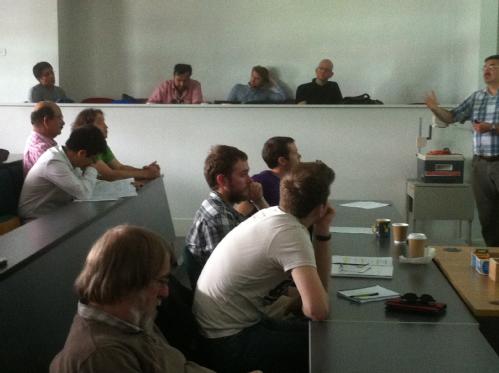Applied Computing News
DIMAP Algorithms Day 2014

On May 21 2014, our Division of Theory and Foundations, jointly with DIMAP, organized DIMAP Algorithms Day 2014. The goal of the event was to bring together the UK community of researchers and graduate students interested in the study of Algorithms, Data Structures, and Complexity.
The event had an outstanding list of invited speakers from the leading academic institutions and research labs (Alexandr Andoni (Microsoft Research Silicon Valley), Graham Cormode (Warwick), Edith Elkind (Oxford), Leszek Gąsieniec (Liverpool), Aleksander Mądry (EPFL)) presenting the recent advances in Algorithms and its applications, and attracted over 60 participants from over the UK and from abroad.
IT firms hope to benefit from big data research with Warwick University partnership

As reported in 'Computer Business Review' and 'Computer World' (14/5/2014)
A new partnership between the University of Warwick and Bull Information Systems has been announced supporting IT developments in Big Data. The new partnership will allow leading research scientists from the university to work alongside business consultants and developers from one of Europe’s foremost suppliers of computing hardware, software and consulting services.
“So much has been discussed about the possibilities of big data yet few businesses have the advanced expertise needed to go beyond this,” said Andrew Carr, CEO of Bull UK and Ireland.
“They may already have a vision but be unsure about how to get there - or they may not even be aware of what they could achieve with the data they hold and need help to identify the opportunities.
“By taking this challenge beyond the mainstream business environment and engaging the best brains possible on the subject, we can help organisations start to realise big data implementations by injecting a new dynamism into high performance project development that will enable them to be the first to market with their initiatives.”
Professor Stephen Jarvis, who is leading the partnership at Warwick, stated that "Bull is committed to open standards and 'open ICT solutions' which allows users, including ourselves, to gain real insight and expertise in developing data analytics infrastructures as well as developing skills in using that infrastructure.”
“Organisations are bombarded by data in diverse forms from social media to connected sensors, but few know how to combine structured and unstructured forms and convert data to information to give real value. We aim to help them overcome these barriers and to develop great commercial applications that will significantly improve the experience of their customers.”
How to tell if a tweet is telling the truth
How to tell if a tweet is telling the truth, The Times, Pages 1-2, 19 February, 2014.
Information we find through social media cannot always be trusted. A study of social media during the Boston bombing of 2013 concluded that 29% of the most viral content were rumours. This is clearly a major problem and, given the volume – Twitter users send 500 million tweets per day – requires the use of automated techniques to solve it. Research has already identified a number of tell-tale features in the digital ‘signatures’ of social media postings and the sources that produce them that are correlated with trustworthiness. These include posting history and connections with other social media users. The Pheme project, a new £3.5M European Union funded research project involving Computer Scientists from the University of Warwick, will build on this research and will also develop ways to analyse topics in postings, their consistency with other sources and distinguish the different ways in which social media users respond to them.
By combining these different approaches, Pheme will create computer tools with improved ability to discriminate between trustworthy and untrustworthy sources and with the capacity to process the large volumes of information circulating in social media daily. These tools will be made widely available for news media, government agencies and community organisations to use. By providing the means to amplify natural self-correction mechanisms in human communication, Pheme will help people to be more confident in assessing the veracity of information they find in social media.
See: http://www.thetimes.co.uk/tto/technology/internet/article4009691.ece
Rob Procter is Professor of Social Informatics in the Department of Computer Science, University of Warwick. He led a multidisciplinary team to work with the Guardian/LSE on the ‘Reading the Riots’ project, analysing tweets sent during the August 2011 riots. This work won the Data Visualization and Storytelling – National/International category of the inaugural Data Journalism Awards sponsored by Google, the 2012 Online Media Award for the ‘Best use of Social Media’. He is a founder member of the Collaborative Online Social Media Observatory (Cosmos), a multidisciplinary group of researchers in England, Scotland and Wales that is building a platform for social media analytics.
